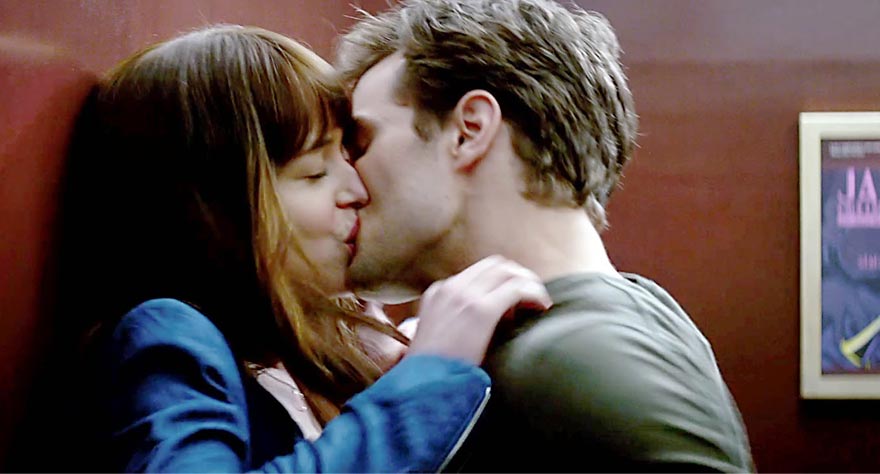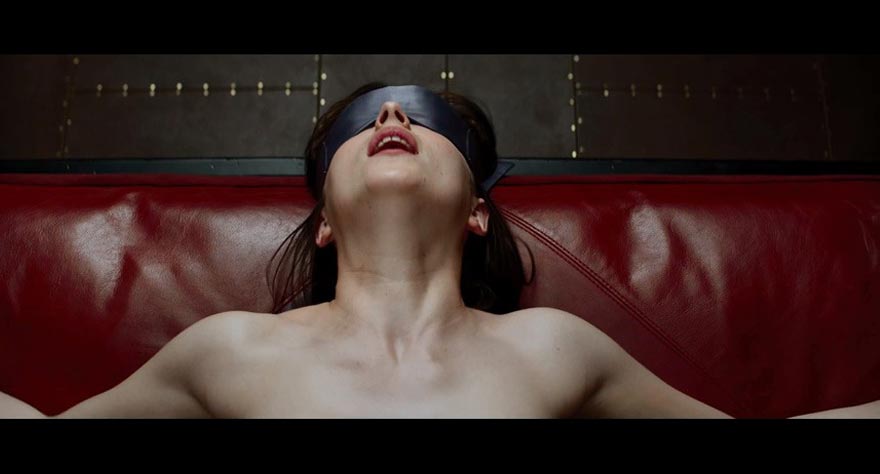
Fans will be satisfied, but those who can look beyond the fantasy will be rightly incensed.

Fans will be satisfied, but those who can look beyond the fantasy will be rightly incensed.
There have been plenty of early reviews around Fifty Shades of Grey, and strangely, while most do focus on its many failings, most critics’ main complaints are around it being less than they expected. Less kinky. Less shocking. Less sexy. Less romantic. That in the end it just doesn’t live up to the hype. I don’t think any of these reviewers saw this film in a packed theater on opening night. I did, and let’s just say there was no doubt in my mind the satisfaction of that first audience when the credits rolled. The book-readers’ pleasure renewed and everyone’s imaginations sparked. Don’t let anyone tell you this film is lacking in sex.
And I’m not saying that’s a good thing. If there’s anything we know from film, there’s no accounting for taste. The “Fifty Shades” book trilogy started as a work of “Twilight” fan fiction and watching its film version one can’t help but recall Kristen Stewart as Bella Swan when watching Dakota Johnson as Anastasia Steele. One Direction put it best, they don’t know they’re beautiful, and that’s what makes them beautiful. Sam Taylor-Johnson has directed a film that will undoubtedly earn her plenty of revenue, maybe a little street cred, and that at the very least she doesn’t have to take credit for writing.
Ana, a soon-to-be college graduate with a degree in English Literature, agrees to cover for her sick roommate (Eloise Mumford) by performing an interview with big-shot business mogul Christian Grey (Jamie Dornan) for their school’s paper. Her lacking interview skills aside, Grey takes an interest in her after only the vaguest of interactions. She’s not afraid to point out his mysteriousness and draw some highly assumptive conclusions about his motivations in business. Most men—most people, really—would be offended, Grey is intrigued.
So he stalks her, showing up at the hardware store where she works, buying your basic everyday bondage items. Ana points out his preparedness for a career as a serial killer. (At least screenwriter Kelly Marcel sees the inherent humor in E.L. James’ novel, and I’ll give her plenty of credit for adapting as her only other script, Saving Mr. Banks, probably didn’t prepare her for this level of soft-core porn.)
Eventually Edward, erm, Christian attempts a date with Ana only to immediately tell her how wrong he is for her. He then sends mixed signals by gifting a few first edition books. So she does what any normal 21-year-old girl would do. She drunk dials him. Happy for an excuse to be authoritative, Christian swoops in just in time to hold her hair back as she vomits onto the sidewalk. True love, indeed. He puts her to bed in his hotel, teases her in the morning by taking his shirt off, and then sweeps her off to Seattle to see his pad.
And here’s where we really start to see the issues with this relationship (if you’re even looking for issues, and most viewers won’t be.) Christian is insanely wealthy, his shiny marble apartment in the grey sky of Seattle (ahem, Vancouver, come on Hollywood we know the difference by now) attesting to his power. Ana in contrast is a recent graduate, with hardly an entry-level job to her name. Their difference in social levels, and Ana’s obvious awe of Christian, already make him rather predatory. When he starts buying her computers, clothes, and even a car, he’s basically buying her loyalty.

But I get ahead of myself. First, Christian reveals to Ana that he has “singular” tastes, which we all know by now refers to his penchant to act the part of a dominant over a submissive in the bedroom. But, to Ana’s dismay, this is the only sort of relationship he allows himself to enter into at all. And it’s by the book, complete with contract. He proposes that Ana become his submissive, and when she meekly admits she’s not sure what she even wants in the bedroom having never done the deed, he promptly “rectifies the situation.”
This film isn’t about romance—though, I’m not convinced that’s really why anyone reads these books or sees this movie—despite all of Ana’s attempts to “fix” Christian and turn him into a man capable of a real relationship. What’s more is that as often as he says he’s incapable of romance and emotional intimacy, Christian acts the part of boyfriend, right down to family introductions and sweeping gestures. Which is confusing, manipulative, and ultimately dangerous.
So here we get down to it. Is Fifty Shades of Grey a film endorsing abuse? Of the physical or sexual variety? Not exactly. What happens between consenting adults for their mutual pleasure can’t technically be construed as abuse. No, Fifty Shades of Grey is a film of psychological abuse and male entitlement. Ana is a woman of no experience, and very little discernment, often misconstruing or being downright oblivious to the advances of men around her. This is a weakness, and one that Christian exploits, finding her to be the kind of woman “needing” his protection. When she shows any sort of retaliation or points out his obsessive behavior he tantalizes her with sex and attention. No man could be unaware of the emotional effect of such behavior. His need to own her is all too perfect an example of male privilege, and her sexual weaknesses make her a victim to his whims. Where it gets extra messed up though, is when Christian allows Ana to try to act as therapist and pay the price for his deep-set emotional problems. It’s there that he is absolutely no better than a physically abusive drunkard hitting his spouse as replacement for seeking help.
All I can hope for is that anyone reading the book series or watching this film looking for an example of a healthy relationship realizes the delusion of such thinking. And that every viewer/reader seeking sexual excitement recognizes the absolute fantasy inherent.
Casting Christian Grey was never going to be difficult. Any able-bodied male actor has it in them to play overbearing and successful. So really, it boils down to his body. And that, I can report, does not disappoint. More surprising is that Dakota Johnson actually manages to be exactly the Anastasia Steele written on the page—thankfully minus her internal dialogue and incessant use of the verbiage “inner goddess”—all the way up to her utter un-believability as a real person. Not going to lie, imagining anyone who actually bites their lower lip as often as Ana does is rather difficult, but Dakota Johnson does it with all the adorability E.L. James hoped for. But a woman who is oblivious to her own beauty, her own desirability, and who thinks she can negotiate a man into loving her by meeting him half-way in his BDSM fantasies? No, that woman is just as much an illusion as Christian.
The film is pretty and just extravagant enough to impress. The stormy skies not-so-subtly hinting at Ana’s tempestuous situation. I predict that soundtrack getting A LOT of play this Valentine’s day—it’s well curated and sexy as hell. Seeing Danny Elfman’s name on-screen for music didn’t surprise me in the least, dark and kinky is right up his alley. The supporting cast soften the film adding to the romantic appearance, especially the mothers (Marcia Gay Harden and Jennifer Ehle), who smile approvingly at every interaction.
There may be a few people who wander into Fifty Shades of Grey and find themselves in for more than they bargained. And there will probably even be a lot of viewers who go in decidedly expectant to view a laughable cult film phenom, and they may find themselves slightly more charmed than they expected. But the majority of those who will throw their money at this film (probably more than once) are those who are either hoping for a true adaptation of the book or who didn’t read it but still want to indulge, and they won’t be disappointed. You either choose to see it for what it is, or enjoy the fantasy disguise it wears well.